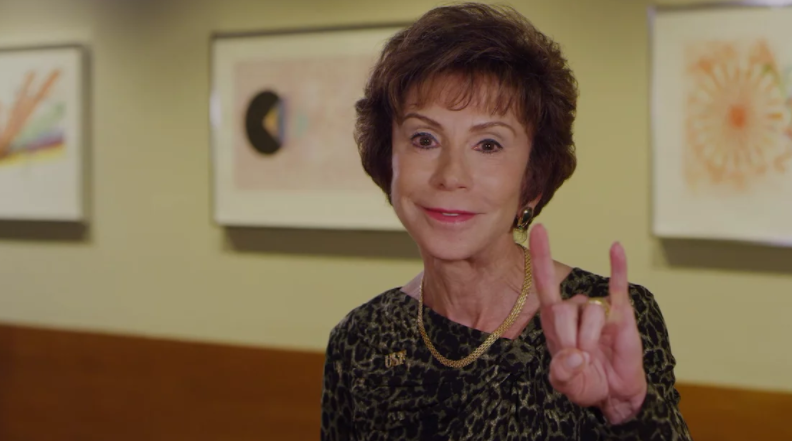
USF system President Judy Genshaft said branch campuses can be “somewhere in-between” a branch campus and an instructional site. But that’s not how it works under the agency that accredits USF. Courtesy of USFSP
By Nancy McCann
When the Legislature passed a law last year to phase out the independent accreditations of USF St. Petersburg and USF Sarasota-Manatee, it came with a mandate to maintain the unique identities of each campus.
When a task force established by legislators to help plan for consolidation reported to the Board of Trustees on Feb. 12, it recommended that St. Petersburg and Sarasota- Manatee be designated branch campuses, as strictly defined in regional accrediting standards.
But when USF system President Judy Genshaft addressed the trustees, she equivocated.
“It’s fine to call them branch campuses,” she said. “What we have to do is find out which structure is the best that fits our personality at the University of South Florida.”
Genshaft told the trustees that branch campuses around the state are structured differently and can be “somewhere in-between” a branch campus and an instructional site.
But that’s not how it works under the Southern Association of Colleges and Schools Commission on Colleges – the agency that accredits USF.
“For accreditation purposes, it’s either one or the other – a branch campus or an off-campus instructional site – and there is nothing in-between,” Belle Wheelan, who has been president of SACSCOC for 14 years, told The Crow’s Nest.
A branch campus, Wheelan said, is a “full-blown operation with someone in charge.”
The distinction between branch campus and instructional site is crucial for the future of USF St. Petersburg.
As a branch campus, it would have its own budgetary and hiring authority and its own faculty and administrative organization.
Anything less than that would be an off-campus instructional site – a designation that is considered less prestigious than branch campus.
The task force recommendations would preserve the president’s “singular leadership role” with the two regional chancellors reporting “directly to the president.”
State Rep. Chris Sprowls, R-Palm Harbor, the principal architect of the 2018 law abolishing St. Petersburg’s independent accreditation, has endorsed the Consolidation Task Force’s recommendations and its call for strong branch campuses.
So has Sen. Bill Galvano, R-Bradenton.
Galvano is president of the state Senate and Sprowls is chairman of the House Rules Committee and House speaker-designate for 2021-2022. Between them, the two lawmakers wield considerable power.
But in her public comments, Genshaft has pointedly declined to embrace the task force’s call for full branch campuses in St. Petersburg and Sarasota-Manatee.
In her presentation at the Feb. 12 trustees meeting, she put up a slide.
On one side was the recommendation of the task force that St. Petersburg and Sarasota-Manatee become branch campuses.
On the other side, they were called “regional campuses.”
***** ***** ***** *****
The regional campus label comes from a group of 86 administrators, professors and staff called the Consolidation Implementation Committee.
The CIC was assembled last spring at the direction of the trustees, according to USF system Provost Ralph Wilcox. And for months, while the task force held public meetings, the CIC worked behind the scenes to develop what it calls “considerations” of its own.
The reports of the task force and the CIC “are equally important parts of the consolidation process,” Wilcox said in an email to The Crow’s Nest.
USF system spokesperson Adam Freeman said using the phrase “regional campus” was “not intended to be a consideration or recommendation.”
“It was meant to be a simple way to quickly refer to USF St. Petersburg and USF Sarasota-Manatee throughout the document (the CIC report), and is not defined by SACSCOC,” he wrote in response to a Crow’s Nest inquiry.
Ray Arsenault, a professor of history and president of USF St. Petersburg’s Faculty Senate, said he has “no idea” what is meant now by the term regional campus.
“When I arrived here in 1980, we were called a regional campus – before separate accreditation (in 2006),” he said. “It concerns me that the term is being used in the present situation.
“It’s implicit in the legislation that St. Pete would be a branch campus as defined by SACS,” Arsenault said. “Anything less shouldn’t even be on the table; there are no hybrids under SACS.
“It’s unacceptable (for St. Petersburg) to become an instructional site.”
Wilcox said the final determination will be made by the accrediting agency.
“The BOT (Board of Trustees) and university leadership will spend the next several months developing the governance and administrative structures, which will then be presented to SACSCOC … ,” he wrote in an email.
“Based on the structure that is submitted, SACSCOC will determine how USF’s campuses are designated from an accreditation standpoint.
“However, for the purposes of everyday conversations, USF can label each campus anything we prefer,” Wilcox said.
Consolidation Task Force chairman Mike Griffin said after last week’s trustees meeting that he thinks things are “moving in the right direction” and he would be surprised if the two small campuses end up as instructional sites.
He said he will continue advocating for branch campuses as defined in the task force recommendations.
“We didn’t spend all this effort and time not to see our recommendations through,” Griffin said.
What’s a branch campus?
According to the Southern Association of Colleges and Schools Commission on Colleges, a branch campus:
• Is permanent in nature.
• Offers courses in educational programs leading to a degree, certificate or other recognized educational credential.
• Has its own faculty and administrative or supervisory organization.
• Has its own budgetary and hiring authority.


